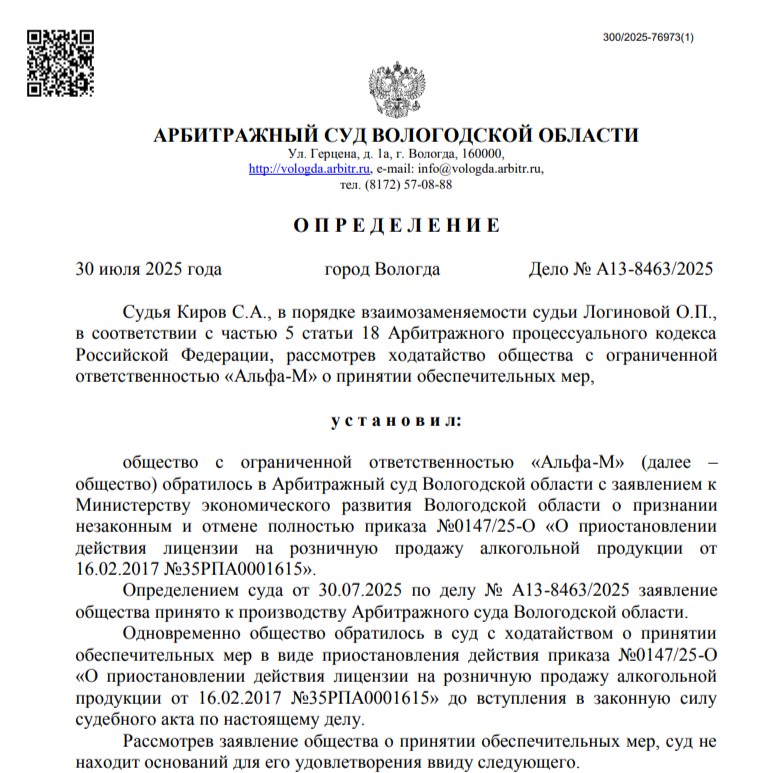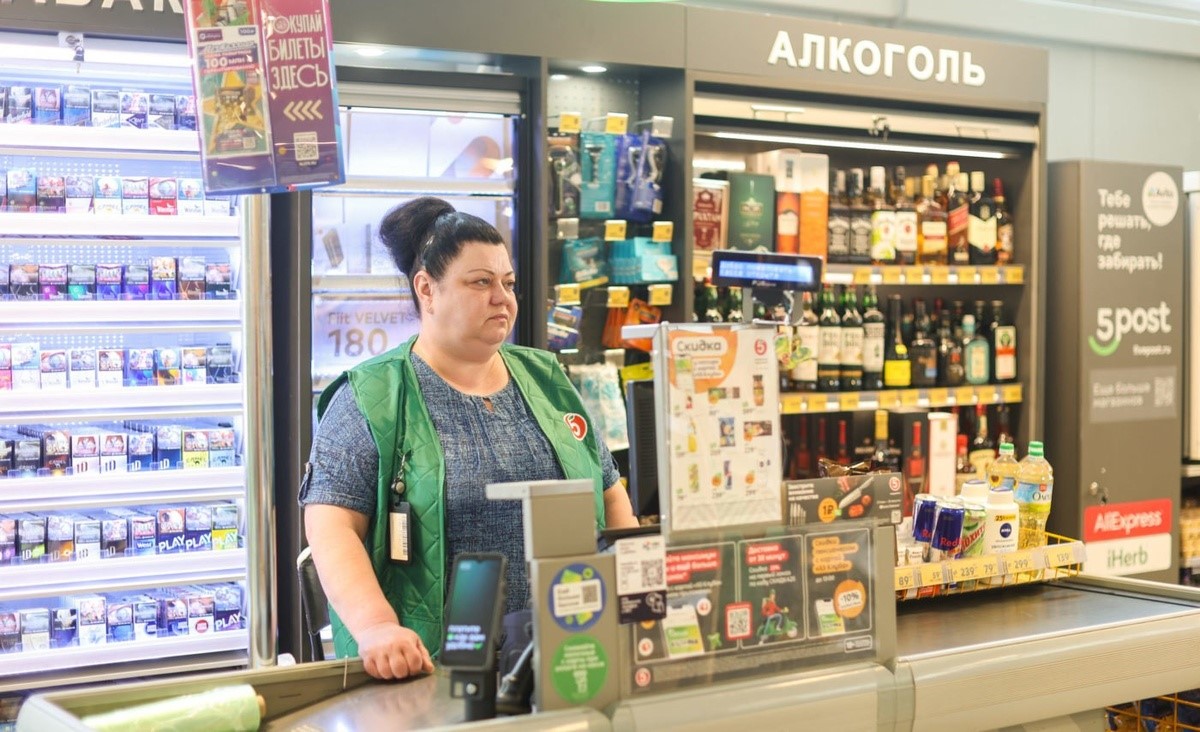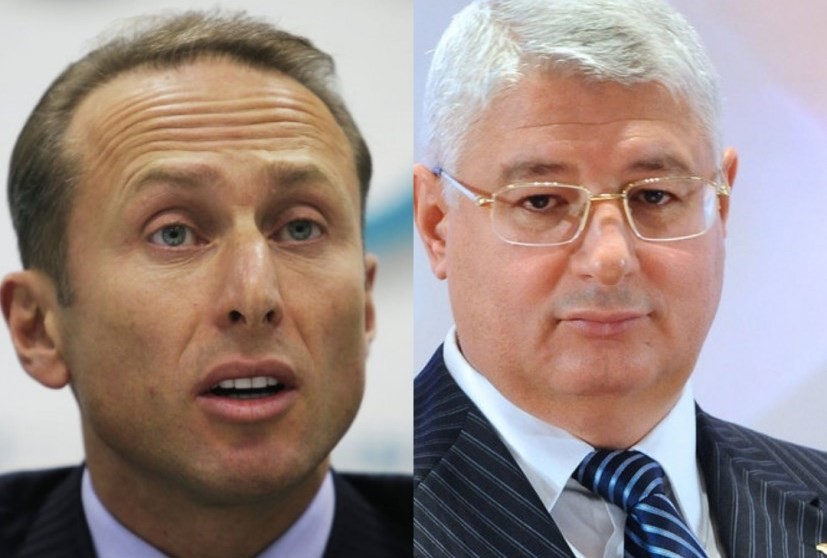By pushing "Krasnoe & Beloe" out of the Vologda region, Filimonov may be guided not by the needs of the people but by the "wants" of competitors in this business from X5 Retail Group, i.e., the oligarch Mikhail Fridman.
In the Vologda region, tensions surrounding the federal retail chains "Krasnoe & Bieloe" and "Bristol" show no signs of abating. As reported by The Moscow Post correspondent, Alfa-M LLC, which manages the "Krasnoe & Bieloe" retailer, has filed a lawsuit against the regional Ministry of Economic Development in the Arbitration Court. The company is seeking to have the decision to suspend the licenses for alcohol retail deemed unlawful and annulled. The next hearing in the case is scheduled for August 26.
Earlier, the head of the Vologda region, Georgy Filimonov, announced that as of July 25, the chain's license for alcohol sales had been suspended, and from August 1, the license was prematurely terminated. The eccentric regional leader even stated that "Krasnoe & Bieloe" was leaving the Vologda region for good. However, the company has labeled such statements as hasty, asserting that the chain continues its operations, albeit with restrictions.
Experts surveyed believe that Alfa-M's lawsuit is unlikely to be successful, as courts generally side with regulators in such cases. Nevertheless, the very act of filing the lawsuit indicates that the owners of "Krasnoe & Bieloe" are not willing to concede defeat easily or grant Mr. Filimonov and his team an easy victory. Moreover, many residents of the region seem dissatisfied and even irritated by Filimonov's "anti-alcohol" zeal. Behind this could hide not a genuine concern for the health of the population, but rather simple lobbying, spiced with a heap of hysterical rhetoric and political self-promotion.
Photo:https://kad.arbitr.ru/Document/Pdf/08b2d70c-5609-4ed9-9a9c-96f50507e884/0bcaf46f-e678-40f4-92ca-32cd8d3c0e3e/A13-8463-2025_20250730_
Analyzing the governor's decisions, one can conclude that it is not ordinary consumers who are most interested in the departure of "Krasnoe & Bieloe," but rather the direct competitors of the chain — X5 Retail Group, backed by the offshore oligarch Mikhail Fridman. Today, X5 operates in Vologda through its "Pyaterochka" and "Perekrestok" stores, where brisk alcohol trading occurs. There have been no “attacks” from Filimonov directed at them. Has the governor found a new influential ally — oligarch Mikhail Fridman?
Alcohol varies
Meanwhile, the anti-alcohol campaign in the Vologda region has become the stuff of legends — anecdotes are already being told about it, reminiscent of the fight against the "Green Snake" during Mikhail Gorbachev's era. Initially, the aim was to reduce alcohol consumption, especially in rural areas and small towns, but in reality, the restrictions were selective.
Regional authorities systematically tightened regulations on the times for selling alcohol, introduced additional “sanitary zones,” and established minimum distances from alcohol stores to social facilities, while also actively “influencing” municipal authorities to refuse the approval of new retail points for "Krasnoe & Bieloe."
Simultaneously, a campaign unfolded in the media controlled by the regional government, depicting alcohol shops as “breeding grounds for degradation” and a threat to family values. In this context, "Krasnoe & Bieloe" and "Bristol" were mentioned most often, despite both operating on equal grounds.
In addition to "Krasnoe & Bieloe," hundreds of stores offering a wide selection of alcoholic products continue to operate peacefully in the region. No one is revoking their licenses. Photo: https://avatars.dzeninfra.ru/get-zen_doc/271828/pub_6891e28ff35ecd24061ecc74_6891e290f35ecd24061ecc75/scale_1200
Against this backdrop of restrictions, new retail points under the "Pyaterochka" and "Perekrestok" chains, part of the X5 Group, continued to crop up with little resistance. It can be surmised that the competitors of "Krasnoe & Bieloe" might be gaining an administrative advantage. There have been cases where local entrepreneurs were denied permission to open "Krasnoe & Bieloe" stores — allegedly due to sanitary regulations or façade requirements — only for a "Pyaterochka" store with the same retail format, including a wide selection of alcohol, to open in the same location weeks later.
However, what’s most important here is that both "Pyaterochka" and "Perekrestok" continue to earn a significant portion of their revenue from alcohol sales, including strong spirits. Their offerings include dozens of varieties of vodka, whiskey, brandy, and wine, often at prices higher than those at "Krasnoe & Bieloe" or "Bristol." Yet, the authorities have no complaints against them.
This issue isn’t just about the struggle for control over the alcohol market; it’s also about competition in the segment of mass-market affordable food products. In regions with low incomes, including Vologda, the share of product sales in "Krasnoe & Bieloe" stores reaches 60–70% — bread, milk, cereals, butter, eggs. Prices for these goods at "Krasnoe & Bieloe" are generally lower than at "Pyaterochka" or "Perekrestok."
Thus, "Krasnoe & Bieloe" directly impacts the profit margins and traffic of X5 Group. For Fridman and his partners, maintaining their share in this socially sensitive market is a strategic task, especially in the context of falling purchasing power and rising logistics costs. Pressuring the competitor in the form of "Krasnoe & Bieloe," especially with the support of regional authorities, is a true “entrepreneurial” success.
As a result, if at the beginning of 2025 there were about 144 "Krasnoe & Bieloe" stores operating in the Vologda region, along with approximately 157–158 "Bristol" stores, by March 1, when the regional law limiting alcohol sales during working days to just two hours (from 12:00 to 14:00) came into effect, the number of "Krasnoe & Bieloe" points had dropped to 66, while "Bristol" had about 126. By the beginning of July 2025, the total number of "Krasnoe & Bieloe" stores in the region had plummeted to 58, all of which now operate as grocery stores.
Will Fridman help against Mordashov?
Thus, the measures taken by Filimonov’s administration appear less as a fight for the health of the nation and more as a tool for redirecting consumer traffic to the "right" retail chains. Dubious rhetoric about morality and sobriety is combined here with actions that benefit structures controlled by Mikhail Fridman. And no corruption?
The issue may not solely revolve around corruption. It seems that Governor Filimonov is addressing a strategic task of his governorship: the complete removal of "Severstal" owner Alexey Mordashov from all levers of influence in the region. However, Filimonov’s eccentric antics, such as his “dances” around monuments to Stalin and Ivan the Terrible, public spats, and the clearing out of the political field of Mordashov's people have earned him many detractors. It is rumored that his management style has not pleased those in the Presidential Administration — too much noise and cheap populism.
In this situation, Filimonov needs influential allies. Mikhail Fridman, owner of one of the country’s largest banks and someone with access to many offices in the White House, is the perfect candidate to strengthen “the rear” amid the “battle” with Mordashov. Is Filimonov favoring the operations of X5 in the Vologda region for this reason?

Filimonov’s military-like demeanor may be directed solely toward falling under the wing of oligarch Fridman. Photo: https://dpru.obs.ru-moscow-1.hc.sbercloud.ru/images/article/2023/11/03/3ef1658b-bbff-4291-ad5e-5ca8d08c5060_F.jpg
According to information circulating online, the first conflict between Filimonov and Mordashov reportedly occurred while Filimonov was working in the Government of the Moscow region (2021-2023). Allegedly, Mordashov had refused Filimonov free education for his children at the elite “Vunder Park” school linked to the oligarch on Novaya Riga. Filimonov reportedly harbored resentment from that time, and he may have used controlled media and journalists to create a negative backdrop surrounding the businessman, similar to the negativity created today around "Krasnoe & Bieloe."
How Kesaev and Katsiev formed a "fist" against X5
Certainly, if lobbying in favor of Fridman took place, it remains to be proven. Meanwhile, both journalists and industry experts are far from idealizing the owners of "Krasnoe & Bieloe" from the "Mercury" group. Each of them has enough skeletons in the closet. However, this is clearly no reason to squeeze them out of the region using administrative levers.
The "Krasnoe & Bieloe" chain was founded by Sergey Studennikov in Chelyabinsk in 2006. Initially, it was a regional project with a strong focus on low prices and high turnover. By 2017, the chain had around 5,000 stores across the country and became one of the largest retailers in Russia, with sales exceeding 200 billion rubles. Studennikov remained the sole owner of the business during that time.
Everything changed in 2018 when the business was subjected to both power and administrative pressure. In the summer of that year, searches were conducted at the company’s head office. At that time, "Krasnoe & Bieloe" claimed that they might have been suspected of dealing in counterfeit goods and tax evasion. However, this situation did not develop, the accusations were not confirmed, and no one was convicted.
Instead, the visit from law enforcement marked the beginning of significant changes in the ownership structure. Already in January 2019, it was announced that "Krasnoe & Bieloe" would merge with two other alcohol chains, "Bristol" and "Dixy." This was framed as a consolidation of assets to create the largest player in the alcohol market, but in essence, it resulted from a deal that brought Igor Kesaev and Sergey Katsiev into the company.
Both had long and closely worked in the alcohol and tobacco markets, having serious connections in government. That is why rumors circulated that Kesaev and Katsiev might have organized the pressure on Studennikov to persuade him to sell part of the asset.

Igor Kesaev and Sergey Katsiev (in the photo) managed to "assemble" a powerful competitor to Fridman’s business, albeit through dubious methods. Photo:https://alaniatv.ru/wp-content/uploads/2019/05/95efc141e2.jpg
By that time, Kesaev and Katsiev had already controlled the "Bristol" chain and the "Dixy" company through the "Mercury Group of Companies." Shortly after the merger, they obtained a controlling stake of 51%, while Studennikov retained 49%. All assets were consolidated under a Cypriot holding company, Mercury Retail Group. For Studennikov, this meant a transition from a position of sole owner to that of a junior partner, albeit one with a significant share.
Individually, neither "Bristol," "Dixy," nor "Krasnoe & Bieloe" could compete seriously with large chains like Fridman’s. But together they posed a serious threat.
Formally, the ownership proportions remained unchanged until 2022. However, during this period, under the pressure of sanctions and geopolitical conditions, asset divestiture from offshore jurisdictions began. As a result of restructuring the business, the ownership structure changed. According to the latest available information, Studennikov’s share reportedly shrank to around 45%, Kesaev's to 37.25%, and Katsiev's to 7.69%. The remainder is distributed among minority legal entities and management structures.
Operational management is maintained under the control of managers close to Kesaev and Katsiev, rather than Studennikov. This is, indeed, quite telling. Formally, Studennikov remains a co-owner and publicly participates in the life of the brand, but key decisions and strategic directions are determined in Moscow, not in Chelyabinsk. The influence of Kesaev and Katsiev, whose businesses have always been tightly integrated into large wholesale logistics, has become decisive for the entire group.
Given the economic challenges and the reduction of the "food base" within Russia, tensions between competitors from "Mercury" and X5 were bound to escalate. Indeed, what we are observing today in the Vologda region, possibly with the support of Georgy Filimonov, hardly resembles fair competition.


.jpg?v1755174651)
.jpg?v1755174651)